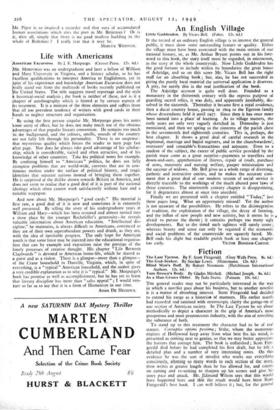Life with Americans
American Excursion. By J. E. Morpurgo. (Cresset Press. I2s. 6d.)
MR. MORPURGO was an undergraduate and later a fellow of William and Mary University in Virginia, and a history scholar, so he has bxcellent qualifications to interpret America to Englishmen, yet in t' pite of his experience and knowledge American Excursion does not cally stand out from the multitude of books recently published on h , e United States. The title suggests travel reportage and the style historical-social analysis ; the book is neither of these, nor is it a Chapter of autobiography which is hinted at by certain aspects of its treatment. It is a mixture of the three elements and suffers from that all too prevalent tendency of writers with good cards in their hands to neglect structure and organisation.
By using the first person singular Mr. Morpurgo gives his notes 'some unity of effect, but he does not make much use of the obvious 'advantages of that popular literary convention. He remains too much in the background, and the colours, smells, sounds of the country 'are not fully felt through his personality. There is no suspense: that mysterious quality which forces the reader to turn page fast after page. Nor does he always take good advantage of his scholar- ship, which is considerable, varied and often attractive, and of his knowledge of other countries. Take his political notes for example. By confining himself to "American" politics, he does not fully recognise problems that are world-wide, currents that are in con- tinuous motion under the surface of political history, and tragic Identities that separate nations instead of bringing them together. He is surprised at the dislike shown towards Britain in America, and does not seem to realise that a good deal of it is part of the national ideology which often cannot work satisfactorily without hate and a suitable scapegoat.
And now about Mr. Morpurgo's "good cards." His material is first rate, a good deal of it is new and sometimes it is extremely well presented. By telling the story of his undergraduate years at William and Mary—which has been restored and almost turned into a show place by the younger Rockefeller's generosity—he reveals valuable information about American education. "Intellectual dis- cipline," he maintains, is always difficult to Americans, convinced as they are of their own superabundant powers and drunk, as they are, with the idea of inevitable progress. The only hope for American youth is that some force may be injected into the educational organisa- tion that can by example and exposition raise the prestige of the lonely processes of creative thought. His chapter "Life Between Clapboards" is devoted to American home-life, which he shared as a guest and as a visitor. There is a glimpse—more than a glimpse— of the Crane household in Danville, Virginia, which, in spite of everything, is a " typical " American household, and the author gives a very credible explanation as to why it is "typical." Mr. Morpurgo's book has promise as well as accomplishment, but he has yet to learn that literary discipline has more than "sales appeal" ; I would ven- ture so far as to say that it is a form of Humanism in our time.
ADAM DE HEGEDUS.






























 Previous page
Previous page